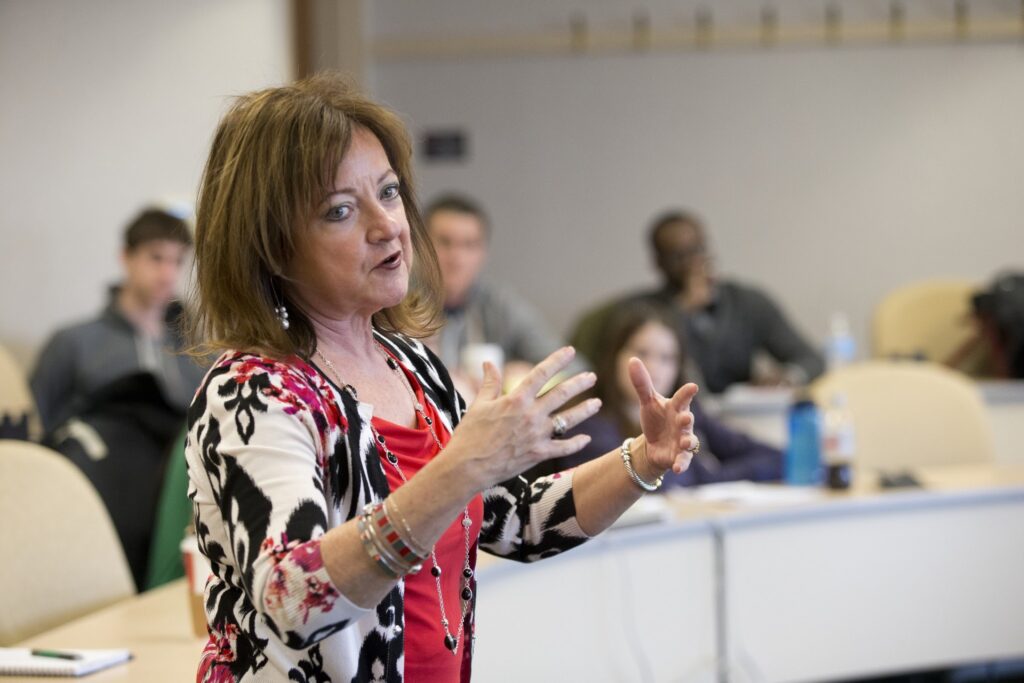Editor’s note: Sidebar is an occasional series exploring the work that Temple Law faculty members take on outside of the classroom and the impact it has on our community.
Each January, Temple Law School marks Martin Luther King Day with service opportunities for faculty and students, including an all-day training for participation in the IRS’ VITA program. Tax Professor Alice Abreu, who also teaches a course in low-income taxpayer policy and practice, has led the effort to train and enlist Temple Law students and faculty as VITA volunteers. We checked in with Professor Abreu to learn more about VITA and its importance to the community.
Q: What is VITA? How does it work?
VITA stands for Volunteer Income Tax Assistance. It’s an IRS program in which volunteers are trained in tax preparation for low-income taxpayers, and then provide free assistance to such taxpayers with completing and filing their income tax returns.
The training on Martin Luther King Day is designed especially for law students and aims to prepare them to take and pass the IRS’s certification test so they can then volunteer at sites throughout the region, including right here on campus, until April 15. All law students are invited to the training, as are Temple Law faculty. To sign up, please visit the link below, but even if you haven’t signed up, you can still attend. Signing up will just give us a more accurate count for the lunchtime pizza!
Can you imagine the difference that can make in the life of a single mom who might be working for minimum wage, or less?
Q: Why would the IRS establish such a program?
It’s because accurate tax returns are in everybody’s interest and tax returns are now used not only for paying taxes but also for receiving government benefits. Today’s income tax system has two important purposes: it not only collects revenue but it is also the largest source of transfers to individuals from the Federal government. For example, through the Earned Income Tax Credit (EITC) the government sends more checks to individuals than it does through TANF and SNAP (the contemporary replacements for what used to be known as welfare and food stamps). That is, people can get a check even if they don’t actually owe any taxes, but they have to file a return to do so. Therefore, many of these benefits are underutilized because eligible taxpayers either don’t know about them or have to incur large tax preparation fees to receive amounts intended to lift them out of poverty.
Q: What are some of the barriers they face?
The tax preparation fees mentioned above and the risk of fraud are the most significant barriers faced by low income taxpayers.
Commercial tax preparers, who have no licensing or other certification requirement, too often prey on taxpayers, filing inaccurate or fraudulent returns to generate large refunds (out of which they can collect large fees). Taxpayers are then responsible for paying the money back to the government when the error or fraud is discovered.
Q: How does VITA help? What do volunteers get out of it?
VITA allows the taxpayers who are the intended beneficiaries of programs such as the EITC to receive the full amount they are entitled to. There is tremendous need for this service in the neighborhoods surrounding main campus, and this is an opportunity to have a direct, positive impact on struggling families right here in our community.
Q: This is your fourth year organizing VITA training at Temple Law and taking volunteer shifts yourself. Why have you made such an ongoing, personal commitment to the VITA program?
The rewards of volunteering are so clearly evident that the benefit of your service is impossible to ignore and is both personally and professionally rewarding. All lawyers have a professional duty to do pro bono work and VITA is pro bono work with an immediate reward, for the taxpayer and for the preparer. The numbers can be really big: I’ve done VITA returns in which someone with $19,000 of gross income receives a check for as much as $7,000, accurately and undiminished by fees. Can you imagine the difference that can make in the life of a single mom who might be working for minimum wage, or less? Taxpayers are grateful and you feel good about not just having helped them but having helped the tax system work as it was intended to work.
The Tax Section of the ABA made a commitment to pro bono and public interest work nearly two decades ago, and I believe in the continuing importance of that commitment. I’m proud to be part of a profession whose leadership values lawyers who use their knowledge to help those who need it, countering the image of the tax lawyer as the number cruncher who just helps the rich keep more of their money. As I said earlier, the tax system doesn’t just take – it also gives, and helping it to do that efficiently is valuable public interest work. In this case it’s also work that is personally rewarding.
To sign up for 2016 VITA training, please visit: http://bit.ly/TLawMLK2016.

